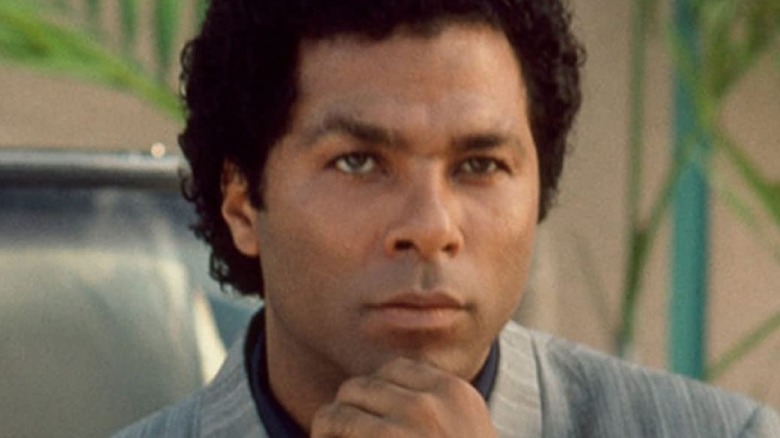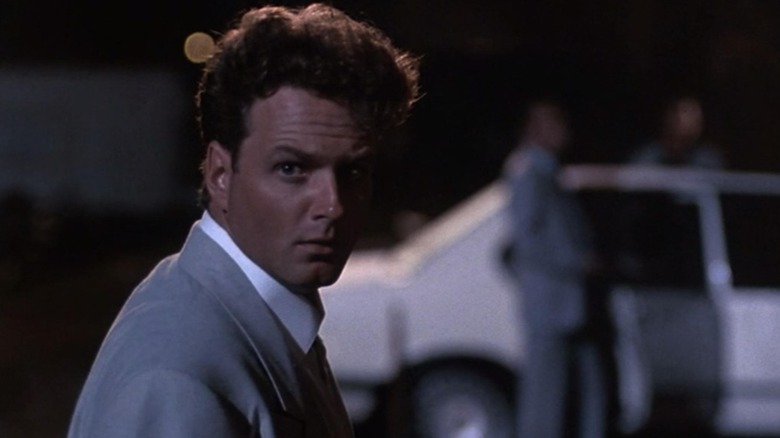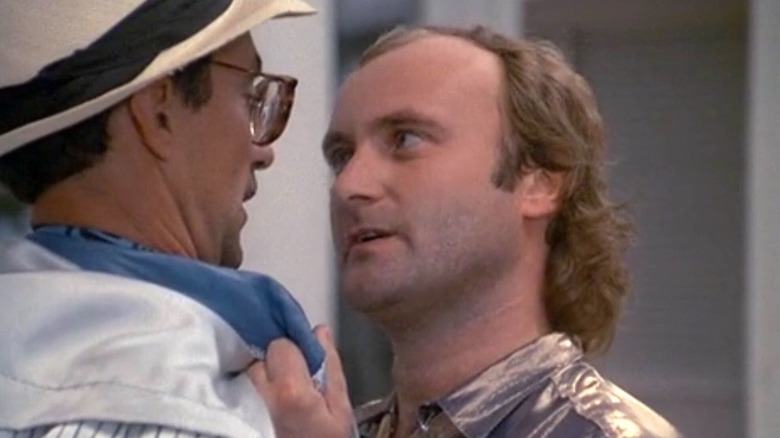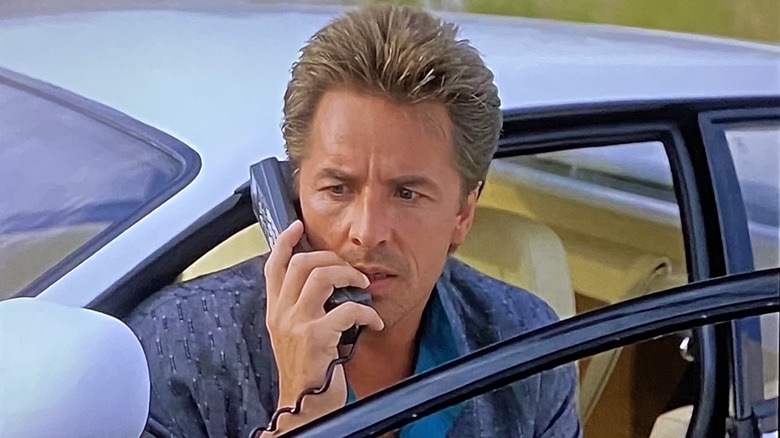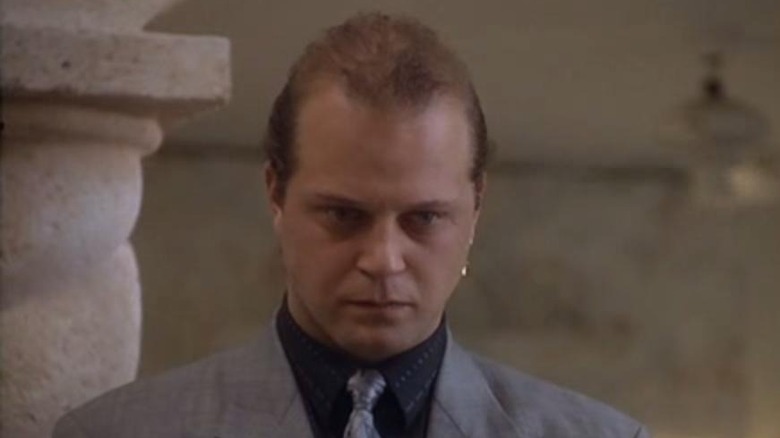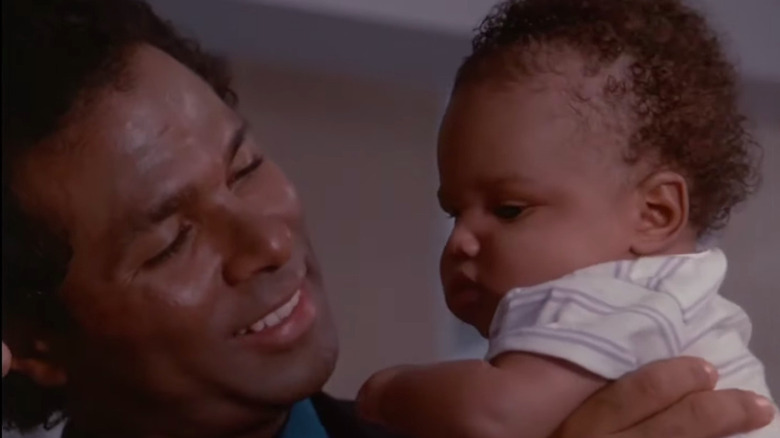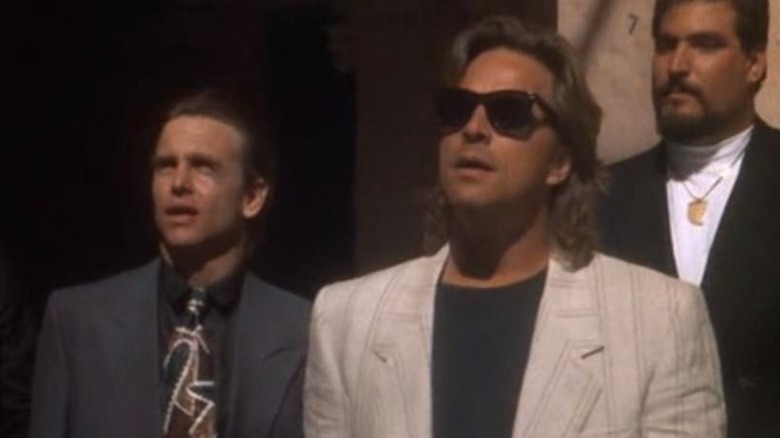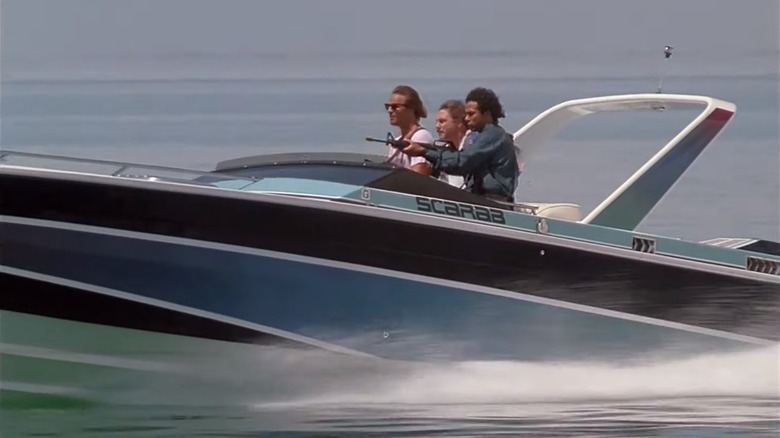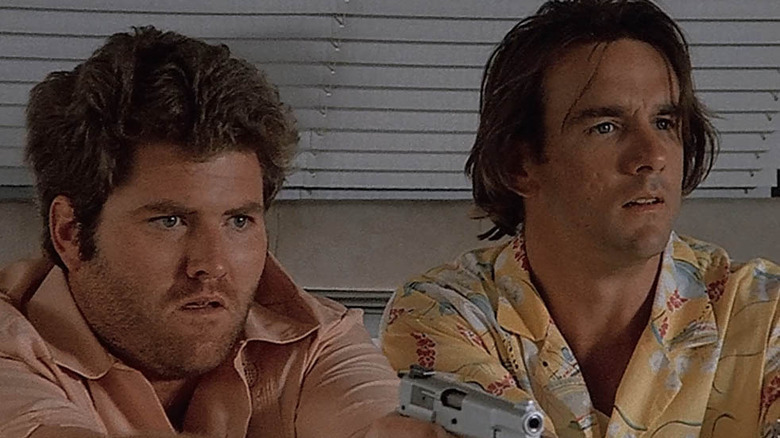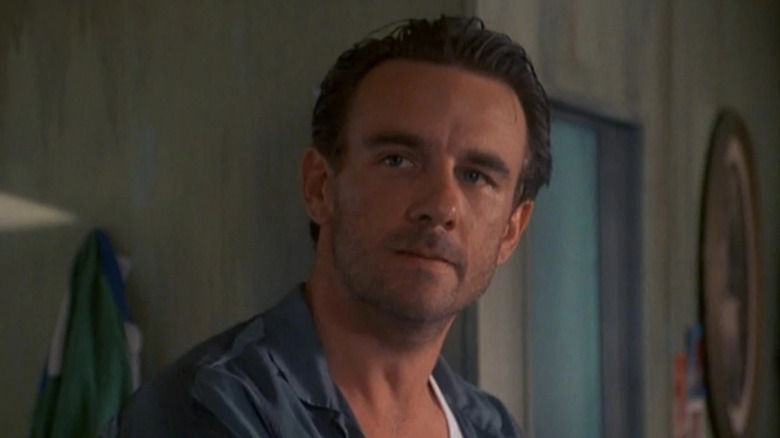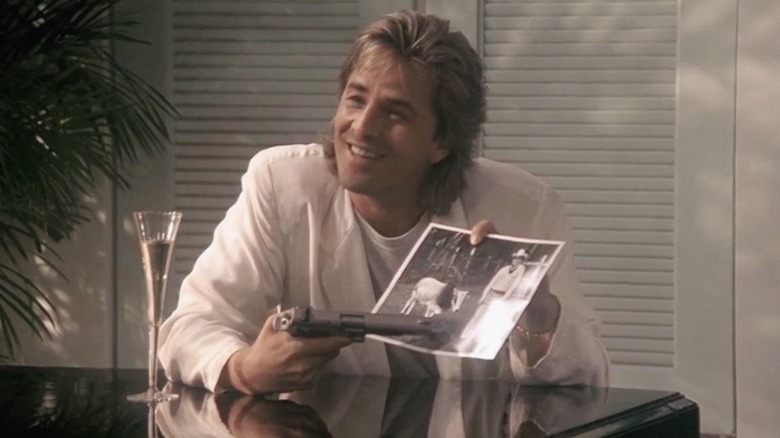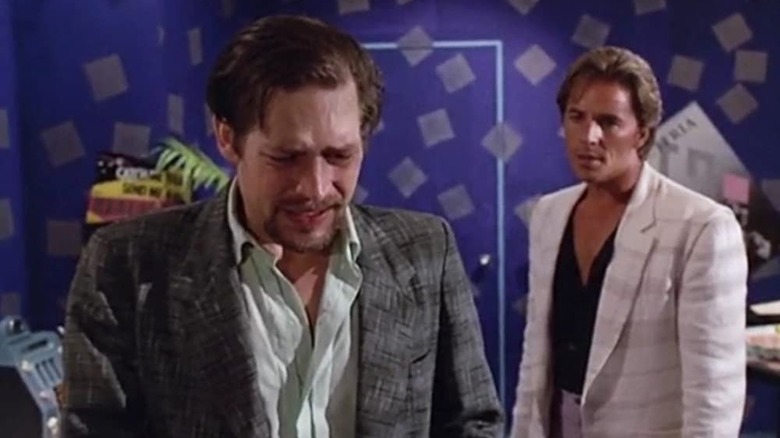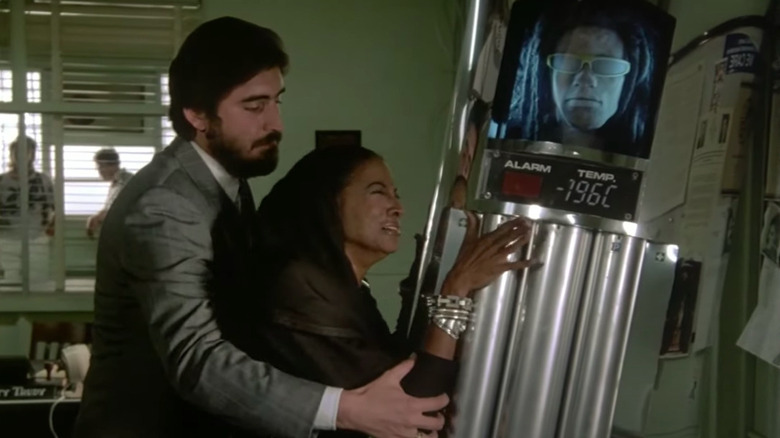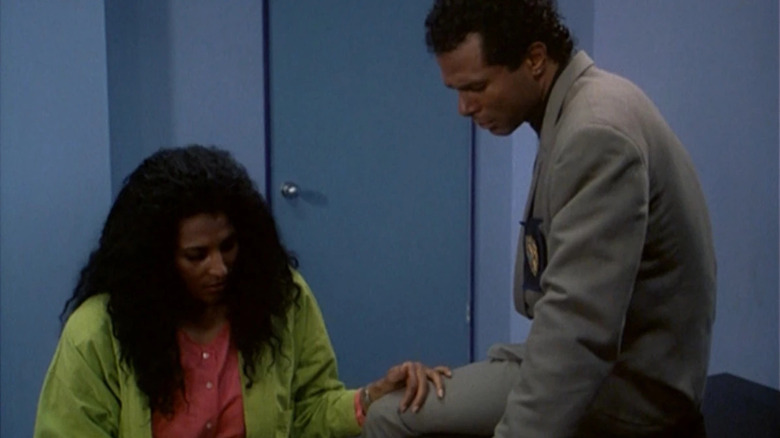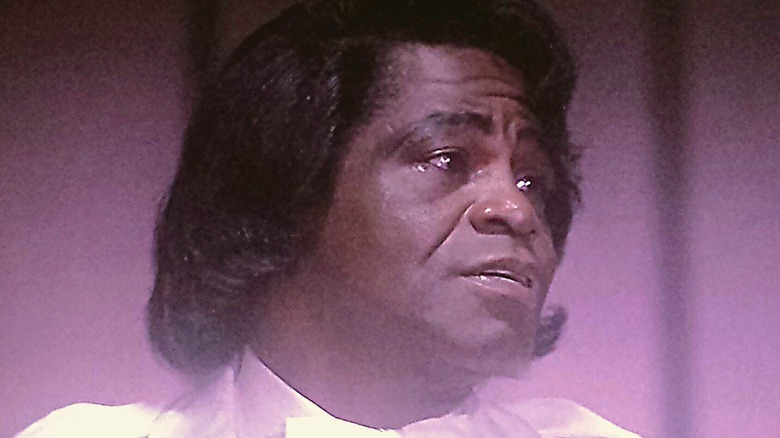The 7 Best And 7 Worst Miami Vice Episodes
When it premiered in 1984, "Miami Vice" changed television forever. Created by Anthony Yerkovich and molded by showrunner Michael Mann, "Miami Vice" brought cinematic gravitas to the television medium. The show combined the music video aesthetic of MTV with stories that focused on character and emotion over rote police procedural storytelling. The pilot (and several other episodes) were two-hour TV movie events. "Miami Vice" instantly became the coolest show on TV and would last for five seasons before ending its run on NBC.
"Miami Vice" is full of memorable episodes that pushed the boundaries of television during a time when the War of Drugs was a particularly hot topic. Mann didn't set out to glorify either side, instead weaving a narrative about good cops fighting an impossible fight. Crockett and Tubbs (played by Don Johnson and Philip Michael Thomas) bust drug dealers, but they've also got corrupt superiors to deal with, and stemming the flow proves increasingly difficult. Low-level dealers are quickly replaced by the next in line, and big time kingpins almost always avoid any kind of real penalty for their crimes. Crockett and Tubbs slowly burn out over the course of the series, as the futility of their crusade becomes evident.
Of course, not every episode can be a winner. Several episodes are considered classics, but for every masterpiece there's an episode that you can definitely skip. Here are the best and worst "Miami Vice" episodes.
Best: Evan
This Season 1 episode features special guest star William Russ as the title character, a rogue ATF agent with a death wish. As it turns out, Evan is wracked with guilt over his backstory. Evan, Crockett, and a cop named Mike Orgel all attended the police academy at the same time and were close friends. However, when Orgel revealed to his friends that he was gay, Evan turned on him and made him a pariah. For his part, Crockett didn't directly participate in the hatred, but he didn't step up to defend his friend, either. After Orgel committed suicide by allowing himself to be killed by a madman with a gun, Evan developed a guilty conscience, feeling he effectively murdered his best friend.
The episode features an unhinged and borderline suicidal Evan seeking death by taking on suicide missions for the ATF. As the episode ends, he warns Crockett that he's next, saying that there's a bullet out there waiting for him. "For writer Paul Diamond to investigate the subject of homosexuality in the police force, especially at the height of the AIDS epidemic in the United States, is nothing short of admirable," Collider said in a review of the episode when it revisited the series in 2022. "But this alone is not why the episode deserves such recognition."
If you or anyone you know is having suicidal thoughts, please call the National Suicide Prevention Lifeline by dialing 988 or by calling 1-800-273-TALK (8255).
Worst: Phil the Shill
One of the sillier episodes of "Miami Vice," Season 2's "Phil the Shill" stars none other than Phil Collins, the famous musician who had many of his songs featured on the show. The pilot episode used "In the Air Tonight," while "No Exit" made use of "I Don't Care Anymore," both of which are signature moments for the series. Unfortunately, "Phil the Shill" is one of the show's weakest episodes thanks to its implausible story and uncharacteristically comedic tone.
Collins plays a game show host who is also a scam artist. When Detective Stan Switek (Michael Talbott) appears on the show, he's swindled out of his winnings and launches an investigation that escalates into a full-tilt Vice case. It doesn't make much sense that a TV game show is actually a scam, and the entire premise really stretches the imagination. In the end, the episode is only noteworthy for featuring a young Kyra Sedgwick in a supporting role and the inclusion of the original song "Life is a Rat Race," which Collins recorded just for the show.
Best: The Good Collar
A recurring theme in "Miami Vice" is that the War on Drugs is a futile effort, led by opportunistic cops (and federal agents) who are more interested in advancing their own careers than in cleaning up the streets. One of the best examples of this theme can be found in "The Good Collar," a downright devastating Season 3 episode that sees Crockett strike up an unlikely friendship with Archie Ellis, a teenage sports star. Busted for drugs, Archie is manipulated by ADA William Pepin (Terry Kinney) and used to catch teenage drug kingpin Curtis "Count" Walker (Samuel Graham).
Crockett played college football in his younger days and sees a bit of himself in Archie, so much so that he gives him one of his prized possessions, a Gator Bowl football he used in a particularly spectacular play. Archie ultimately pays the price for ADA Pepin's ambition. After being forced to wear a wire, he manages to get Walker to incriminate himself, but not without accidentally blowing his cover. What happens next is shocking and heartbreaking, and helps to cement Crockett's disillusionment with the broken justice system.
Worst: The Lost Madonna
Before he redefined the criminal cop genre with "The Shield" on FX, Michael Chiklis starred in "The Commish," a popular off-kilter cop show that ran for five seasons in the 1990s. Prior to that, however, he popped up in "The Lost Madonna," one of the most forgettable episodes of "Miami Vice." The ultimate filler episode, "The Lost Madonna" commits the ultimate "Miami Vice" crime in that it feels like it could be an episode of any 1980s cops show.
Chiklis plays Jeffrey Whitehead, an NYPD detective on the hunt for the eponymous stolen sculpture, which is worth a fortune. In a last-minute twist, Whitehead steals the sculpture for himself and then dresses up as a Jamaican in order to evade capture. Needless to say, it doesn't work. His ridiculous costume is the one memorable element in an episode that otherwise has no discernible identity. There are worse episodes of "Miami Vice," but few are as painfully bland as "The Lost Madonna."
Best: Sons and Lovers
The pilot of "Miami Vice" deals with Tubbs moving from New York to Miami to pursue Esteban Calderone (Miguel Piñero), a big-time drug kingpin. He gets away at the end, only to meet his end in the two-part Season 1 episode "Calderone's Return." That episode also introduced Calderone's daughter, Angelia (Phanie Napoli), who falls in love with Tubbs, though she spurns him following her father's death. The Calderone storyline then lay dormant until the Season 2 finale "Sons and Lovers."
"Sons and Lovers" introduces Calderone's son Orlando, played by a 21-year-old John Leguizamo. Orlando is even more ruthless than his father. He goes to extreme measures to get revenge on Tubbs. The episode goes into shockingly dark territory, with Orlando murdering his own sister just to get to Tubbs and sending him a threatening note at her funeral, promising that his revenge isn't over yet. It's not a cliffhanger, but an outright defeat suffered by the heroes.
John Leguizamo would return in Season 3's "The Afternoon Plane," which closes the book on his war against Tubbs.
Worst: Jack of All Trades
"Jack of All Trades" introduces the character Jack Crockett, Sonny's hitherto unheard of cousin. Bringing in a never-before-seen, long-lost family member can be a successful storytelling device if used wisely. Unfortunately, this Season 5 episode of "Miami Vice" is not an example of that.
While David Andrews (known for films like "Apollo 13" and "Terminator 3: Rise of the Machines") is decent as Sonny's con-man cousin, and their familial chemistry is interesting to watch, there's something missing from "Jack of All Trades." Maybe it's the lighthearted tone that reduces the stakes, or the music selections by a capella group The Swingle Singers, which don't fit the style of "Miami Vice." There's also the fact Tubbs is barely featured in the episode, when he could serve as a more effective voice of reason against Jack's deceptive nature. Perhaps if Jack Crockett made another appearance in "Miami Vice," his character could have been more fleshed out. As it is, he's just a footnote in one of the series' most forgettable episodes.
Best: Out Where the Buses Don't Run
Bruce McGill (who you will recognize from films like "Reacher" and "Run All Night") guest stars in "Out Where the Buses Don't Run," an early Season 2 episode. He plays Hank Weldon, a burned out retired Vice cop who teams up with Crockett and Tubbs in order to complete his "one last case," but his questionable mental state suggests nothing is quite as it seems. Is he completely nuts, or are his leads genuine? Weldon is an unreliable guide, but he also holds all the cards, leaving Crockett and Tubbs no choice but to follow him into the darkness.
"Out Where the Buses Don't Run" is quintessential "Miami Vice" in that it tells a relatively simple and straightforward story through emotional music video sequences as much as traditional dialogue scenes. It all culminates in a breathtaking sequence set to "Brothers in Arms" by Dire Straits, in which Weldon reveals the truth of his final case and comes clean about all the lies and pain he's held inside for so many years.
Worst: Made for Each Other
John Diehl and Michael Talbott are well-cast as Zito and Switek, supporting members of the Organized Crime Bureau who generally serve as backup when Crockett and Tubbs go undercover. Unfortunately, they were frequently written as comic relief characters, and they often detract from the film noir storylines of the first two seasons. Late in Season 1, they get their own episode, "Made for Each Other," and it's not great. In fact, it's pretty awful.
"Made for Each Other" consists entirely of shenanigans between Zito and Switek. Their plucky comic antics in Season 1 are often the weakest part of better "Miami Vice" episodes, and they're unbearable as the main focus. Early "Miami Vice" had a bit too much comic relief. By Season 2, the Zito and Switek comedy bits would be largely sidelined, and Neville "Noogie" Lamont (played by late comedian Charlie Barnett) would be phased out of the series, only making a single appearance in Season 4 (we'll get to that later). As a result, the sole remaining comic relief character in Season 3 onwards would be Izzy Moreno, played by Martin Ferrero (best known for playing the guy who gets eaten while hiding in a toilet in "Jurassic Park").
Best: Down for the Count, Parts 1 and 2
Zito and Switek were often underserved in "Miami Vice," so it's ironic that their finest hour came in Season 3's "Down for the Count" two-parter, in which Zito is murdered. He goes undercover as a boxing manager and discovers a convoluted scheme led by Oswaldo Guzman, a fight-fixing bookie. Part 1 ends with Zito failing to muscle in on Guzman's operation. As payback for his efforts, Guzman captures Zito and gives him a fatal drug overdose, making it look like a suicide. The final scene of part 1, in which Switek finds his partner's body, is haunting, especially with Steve Winwood's "There's a River" setting a somber mood for the tragic scene.
Part 2 sees the remaining members of the Vice squad teaming up to take down Guzman and clear Zito's name. Oddly, though the episode ends with Guzman dead, it's never explained how they clear Zito's name. It's a strange plot hole, but it doesn't overshadow the righteous excitement of seeing Switek get justice for his fallen friend. In any case, the Zito and Switek dynamic that sometimes derailed earlier episodes is no longer at play after "Down for the Count," and Switek becomes a mostly serious character for the remainder of the series.
If you or anyone you know is having suicidal thoughts, please call the National Suicide Prevention Lifeline by dialing 988 or by calling 1-800-273-TALK (8255).
Worst: The Cows of October
"The Cows of October" deserves credit for its cool Western genre aesthetics and for its use of the popular supporting character Izzy Moreno (Martin Ferrero). Unfortunately, that's pretty much everything positive there is to say about this Season 4 episode. First of all, while Izzy is an entertaining supporting character, he was never supposed to support an entire episode the way he does here. While fantastic in his brief appearances in other episodes, Izzy is just too cartoony for the generally serious world of "Miami Vice." As a result, the rest of the cast has their silliness cranked up and their competence turned down in order to fit Izzy's sensibilities.
Worst of all, "The Cows of October" isn't about drugs, counterfeit money, gambling, or anything remotely associated with "Miami Vice." Instead, the MacGuffin is bull semen. Yes, there is an episode of "Miami Vice" about the illegal distribution of bull semen. While there's some novelty value in the episode, and the Western trappings are pretty pleasing on the eye, it's ultimately one of the series' weakest hours.
Best: Buddies
This early Season 2 episode features a plethora of guest stars, none of whom feel gimmicky in their casting. James Remar plays Robert Cann, an old college friend of Crockett. They served together in Vietnam, but Crockett knows nothing of Robert's secret connection to an organized crime racket, led by Frank Doss (Frankie Valli). Meanwhile, Dorothy Bain (Eszter Balint) is on the run with her baby boy after killing a stand-up comedian and would-be rapist played by Nathan Lane. Unbeknownst to her, she inadvertently stole a bag full of illegal gambling sheets, leading to the entire Florida mafia aiming to hunt her down.
Ultimately, Cann must choose between doing the right thing or allowing organized crime to reign without resistance. The world of "Miami Vice" can be nihilistic and cynical, but individual characters are often tasked with making the right choice, disregarding the profit motive that causes so many to ignore injustice. Following a dramatic pep talk from Crockett, Cann elects to do the right thing, taking the law into his own hands and fighting against all odds to protect Dorothy and her baby from a hit squad. Naturally, this involves a thrilling car chase that culminates in a violent shootout, all set to "No Guarantees" by New Wave band The Nobodys.
Worst: The Big Thaw
One of the most bizarre episodes of "Miami Vice," "The Big Thaw" inexplicably dives into weird science fiction territory. The story involves a custody battle over the body of a dead reggae singer, played by Raycell Long. Except, he's not really dead — he's cryogenically frozen. Alfred Molina (best known for his turn as Marvel's Dr. Otto Octavius, aka Doctor Octopus, on the big screen) appears as an unnamed attorney for the singer's heartbroken widow.
While "Miami Vice" is set in a somewhat heightened reality (most cops don't get into heated gunfights every week, and the show's legendary fashion choices were over-the-top, even for the 1980s), it doesn't handle outright sci-fi. Or, at least, it's not supposed to, as "The Big Thaw" proves hands down. The episode feels nothing like "Miami Vice" and its custody battle storyline is just plain boring. If there's a single redeeming moment in the episode, it's the final shot, which shows the reggae singer's frozen sci-fi casket floating in the middle of the ocean, the sun setting behind it. It's a wacky image befitting such a bizarre episode.
Best: Too Much, Too Late
While "Freefall" is the official finale of "Miami Vice," ending the series on a definitive, bittersweet note, it's not the final episode ever broadcast on television. That honor belongs to "Too Much, Too Late," which never aired on NBC, possibly due to its content: It's the most disturbing and outright depressing episode of "Miami Vice" ever made. It's also one of the best. The episode ultimately aired in January 1990 on the USA Network, eight months after "Freefall."
It's a shame "Too Much, Too Late" was skipped over by NBC, since it's integral to setting up the finale, moving various chess pieces into place, especially for Tubbs. It features the return of recurring character Valerie Gordon (played by Pam Grier), who first appeared in Season 1's "Rites of Passage." Her interactions with Tubbs inform his performance in "Freefall." The episode also touches on Switek's gambling addiction, which plays an important role in the finale. All in all, "Too Much, Too Late" is essential viewing for any "Miami Vice" fan, and a tremendous hour of television.
Worst: Missing Hours
"Missing Hours" is the worst episode of "Miami Vice" by a wide margin. The script involves an alien played by James Brown abducting Trudy... Or maybe he's a government agent? In some ways, it feels like a prototype version of the more meta episodes of "The X-Files." To say it's a mismatch for the world of "Miami Vice" is an understatement. In addition to James Brown, the episode features a young Chris Rock and the final appearance of Charlie Barnett as "Noogie" Lamont.
Like most of the bad episodes we've looked at on this list, "Missing Hours" doesn't feel at all like a "Miami Vice" episode, and it suffers greatly as a result. To top it all off, it resorts to a cheap "It was all just a dream... Or was it?" ending. That's right, "Missing Hours" is so bad it doubts its own canonicity. For the sake of the "Miami Vice" legacy, it's best to pretend this hour of television never happened.
